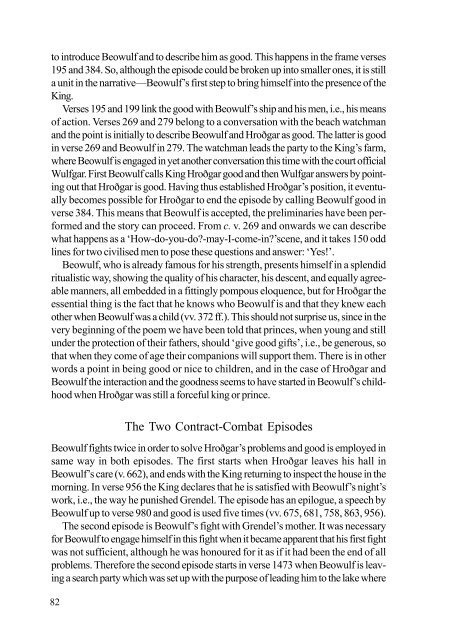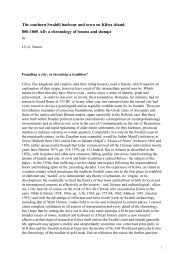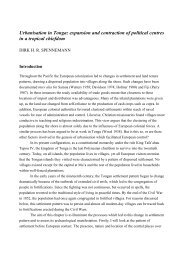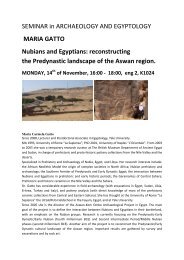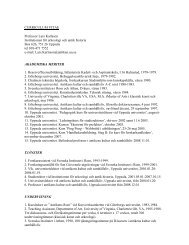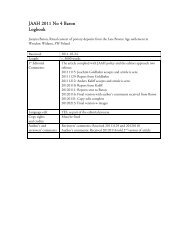Beowulf - Institutionen för arkeologi och antik historia
Beowulf - Institutionen för arkeologi och antik historia
Beowulf - Institutionen för arkeologi och antik historia
Create successful ePaper yourself
Turn your PDF publications into a flip-book with our unique Google optimized e-Paper software.
to introduce <strong>Beowulf</strong> and to describe him as good. This happens in the frame verses<br />
195 and 384. So, although the episode could be broken up into smaller ones, it is still<br />
a unit in the narrative—<strong>Beowulf</strong>’s first step to bring himself into the presence of the<br />
King.<br />
Verses 195 and 199 link the good with <strong>Beowulf</strong>’s ship and his men, i.e., his means<br />
of action. Verses 269 and 279 belong to a conversation with the beach watchman<br />
and the point is initially to describe <strong>Beowulf</strong> and Hroðgar as good. The latter is good<br />
in verse 269 and <strong>Beowulf</strong> in 279. The watchman leads the party to the King’s farm,<br />
where <strong>Beowulf</strong> is engaged in yet another conversation this time with the court official<br />
Wulfgar. First <strong>Beowulf</strong> calls King Hroðgar good and then Wulfgar answers by pointing<br />
out that Hroðgar is good. Having thus established Hroðgar’s position, it eventually<br />
becomes possible for Hroðgar to end the episode by calling <strong>Beowulf</strong> good in<br />
verse 384. This means that <strong>Beowulf</strong> is accepted, the preliminaries have been performed<br />
and the story can proceed. From c. v. 269 and onwards we can describe<br />
what happens as a ‘How-do-you-do?-may-I-come-in?’scene, and it takes 150 odd<br />
lines for two civilised men to pose these questions and answer: ‘Yes!’.<br />
<strong>Beowulf</strong>, who is already famous for his strength, presents himself in a splendid<br />
ritualistic way, showing the quality of his character, his descent, and equally agreeable<br />
manners, all embedded in a fittingly pompous eloquence, but for Hroðgar the<br />
essential thing is the fact that he knows who <strong>Beowulf</strong> is and that they knew each<br />
other when <strong>Beowulf</strong> was a child (vv. 372 ff.). This should not surprise us, since in the<br />
very beginning of the poem we have been told that princes, when young and still<br />
under the protection of their fathers, should ‘give good gifts’, i.e., be generous, so<br />
that when they come of age their companions will support them. There is in other<br />
words a point in being good or nice to children, and in the case of Hroðgar and<br />
<strong>Beowulf</strong> the interaction and the goodness seems to have started in <strong>Beowulf</strong>’s childhood<br />
when Hroðgar was still a forceful king or prince.<br />
82<br />
The Two Contract-Combat Episodes<br />
<strong>Beowulf</strong> fights twice in order to solve Hroðgar’s problems and good is employed in<br />
same way in both episodes. The first starts when Hroðgar leaves his hall in<br />
<strong>Beowulf</strong>’s care (v. 662), and ends with the King returning to inspect the house in the<br />
morning. In verse 956 the King declares that he is satisfied with <strong>Beowulf</strong>’s night’s<br />
work, i.e., the way he punished Grendel. The episode has an epilogue, a speech by<br />
<strong>Beowulf</strong> up to verse 980 and good is used five times (vv. 675, 681, 758, 863, 956).<br />
The second episode is <strong>Beowulf</strong>’s fight with Grendel’s mother. It was necessary<br />
for <strong>Beowulf</strong> to engage himself in this fight when it became apparent that his first fight<br />
was not sufficient, although he was honoured for it as if it had been the end of all<br />
problems. Therefore the second episode starts in verse 1473 when <strong>Beowulf</strong> is leaving<br />
a search party which was set up with the purpose of leading him to the lake where


